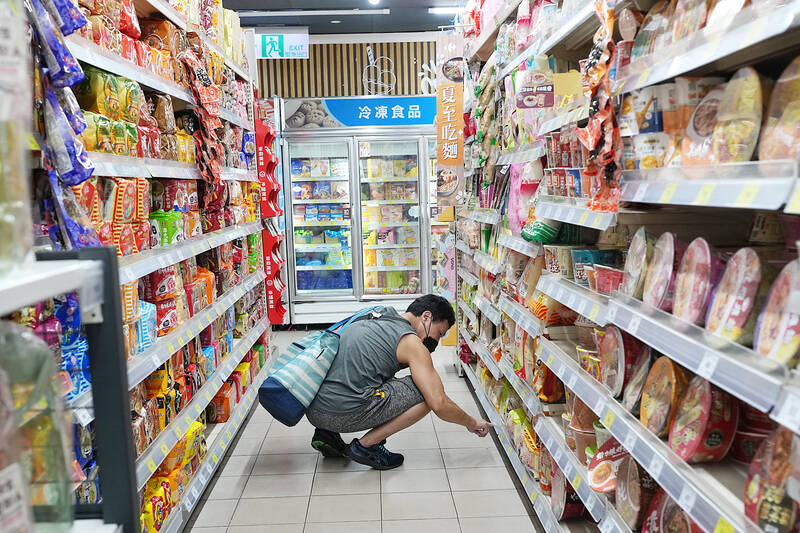Although the government on Friday raised its GDP growth forecast for this year to 4.45 percent due to stronger-than-expected artificial intelligence (AI)-driven exports, economists said that US tariffs and weak domestic consumption could hurt growth momentum in the coming months.
The US imposed a baseline tariff of 20 percent on goods made in Taiwan that took effect on Aug. 7, higher than the 15 percent tariffs imposed on goods made in Japan and South Korea, raising concern over the tariff’s impact on Taiwan’s economy.
US tariff policy remains a major uncertainty for Taiwan’s economy, and the government needs to clearly assess its economic impact, the Taiwan Institute of Economic Research’s Economic Forecasting Center director Gordon Sun (孫明德) said.

Photo: CNA
However, Taiwan’s exports would remain stable in the coming months, because 70 percent of its exports are information and communications technology products, which are currently unaffected by the US tariffs, Sun said.
The other 30 percent are exports of products from non-tech industries, which have come under pressure, but most of those exports tend to go to China and Southeast Asia, not the US, and therefore should not be too badly affected, he said.
In addition, the government has also introduced support programs for exporters and subsidies for affected industries, which could function as “insurance” to soften the blow, he said.
The bigger economic challenge for Taiwan in the coming months is domestic demand, he said.
Retail sales fell 0.4 percent year-on-year in the first half of this year, and 2.9 percent in June alone, he said, citing data from the Ministry of Economic Affairs.
There are two reasons for weak consumption: uncertainty over the tariffs, which has delayed car purchases, and a cooling property market after government measures against speculation, which has hurt consumer confidence, he said.
To boost confidence, the government must take more proactive measures, such as universal cash handouts to stimulate demand and monetary easing by the central bank, Sun said.
National Central University Research Center for Taiwan Economic Development director Dachrahn Wu (吳大任) said that US President Donald Trump’s tariff policy is aimed at forcing companies to invest and produce in the US.
That could squeeze domestic investment and drive high-paying jobs overseas, severely damaging Taiwan’s domestic demand, Wu said.
Businesses must be mentally prepared for a long struggle, as tariffs have become the new normal regardless of US leadership, National Central University economics professor Chiou Jiunn-rong (邱俊榮) said.
Trump’s broader tariff war could restructure supply chains and alter global business cycles, slowing growth for years, and while subsidies could help affected industries in the short term, they risked leaving uncompetitive industries stagnant, Chiou said.
In the longer term, Taiwan needs to consolidate its strength in semiconductors and reinforce sectors less exposed to tariffs, including applications, software and smart systems, to maintain competitiveness amid economic uncertainty, he said.
The academics’ comments came after the Directorate-General of Budget, Accounting and Statistics (DGBAS) on Friday sharply raised its GDP growth forecast for this year to 4.45 percent from the 3.1 percent it estimated in May.
It attributed the upward revision to a surge in exports and private investment driven by strong AI demand.
However, the DGBAS revised growth in private consumption down to 0.85 percent. Of the 4.45 percent projected gains in GDP, net external demand contributed 2.71 percentage points, while private consumption contributed only 0.4 percentage points, the DGBAS said.

In Italy’s storied gold-making hubs, jewelers are reworking their designs to trim gold content as they race to blunt the effect of record prices and appeal to shoppers watching their budgets. Gold prices hit a record high on Thursday, surging near US$5,600 an ounce, more than double a year ago as geopolitical concerns and jitters over trade pushed investors toward the safe-haven asset. The rally is putting undue pressure on small artisans as they face mounting demands from customers, including international brands, to produce cheaper items, from signature pieces to wedding rings, according to interviews with four independent jewelers in Italy’s main

Japanese Prime Minister Sanae Takaichi has talked up the benefits of a weaker yen in a campaign speech, adopting a tone at odds with her finance ministry, which has refused to rule out any options to counter excessive foreign exchange volatility. Takaichi later softened her stance, saying she did not have a preference for the yen’s direction. “People say the weak yen is bad right now, but for export industries, it’s a major opportunity,” Takaichi said on Saturday at a rally for Liberal Democratic Party candidate Daishiro Yamagiwa in Kanagawa Prefecture ahead of a snap election on Sunday. “Whether it’s selling food or

CONCERNS: Tech companies investing in AI businesses that purchase their products have raised questions among investors that they are artificially propping up demand Nvidia Corp chief executive officer Jensen Huang (黃仁勳) on Saturday said that the company would be participating in OpenAI’s latest funding round, describing it as potentially “the largest investment we’ve ever made.” “We will invest a great deal of money,” Huang told reporters while visiting Taipei. “I believe in OpenAI. The work that they do is incredible. They’re one of the most consequential companies of our time.” Huang did not say exactly how much Nvidia might contribute, but described the investment as “huge.” “Let Sam announce how much he’s going to raise — it’s for him to decide,” Huang said, referring to OpenAI

The global server market is expected to grow 12.8 percent annually this year, with artificial intelligence (AI) servers projected to account for 16.5 percent, driven by continued investment in AI infrastructure by major cloud service providers (CSPs), market researcher TrendForce Corp (集邦科技) said yesterday. Global AI server shipments this year are expected to increase 28 percent year-on-year to more than 2.7 million units, driven by sustained demand from CSPs and government sovereign cloud projects, TrendForce analyst Frank Kung (龔明德) told the Taipei Times. Demand for GPU-based AI servers, including Nvidia Corp’s GB and Vera Rubin rack systems, is expected to remain high,